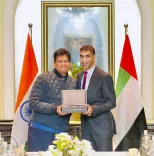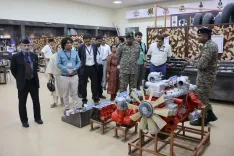Can Eco-friendly Ganeshas Transform Festivities in Gujarat?

Synopsis
Key Takeaways
- Empowerment: Local women gain economic independence through crafting.
- Sustainability: Eco-friendly idols dissolve harmlessly in water.
- Community Impact: The initiative promotes environmental awareness.
- Cultural Preservation: Merges traditional artistry with ecological responsibility.
- Awareness: Encourages responsible celebration among devotees.
Sabarkantha, Aug 20 (NationPress) As the Ganesh Utsav approaches, a remarkable women’s self-help group in Kukadia village, located in Idar, Sabarkantha, is capturing attention for creating eco-friendly clay Ganesha idols. This initiative provides a sustainable alternative to Plaster of Paris (PoP) idols, which are known to adversely affect the environment.
The project, initiated three years ago as part of the state government’s women empowerment training programme, has not only empowered local women economically but is also setting a benchmark for environmentally conscious celebrations.
In 2021, the Gujarat government established a training program in Kukadia to foster self-reliance among women through pottery and clay crafts. From an initial batch of 30 women, 10 have transitioned to producing clay Ganesha idols for commercial sale, with the idols measuring between one to three feet tall and crafted from natural clay.
“Our aim transcends mere profit; we aspire to honor Mother Earth,” stated Nayna Ben Prajapati, a member of the women’s group.
“Unlike PoP idols, our clay creations dissolve completely in water, posing no threat to soil or water bodies,” added Jagruti Prajapati, another artisan.
In stark contrast to PoP idols that take days to break down and often leave harmful remnants in aquatic environments, the clay idols dissolve within minutes, allowing the residual material to be repurposed for gardening or composting, thus encouraging the circular use of natural resources.
“I purchased one of the clay Ganeshas this year. I refuse to witness broken idols post-visarjan again. This option is both respectful and environmentally friendly,” remarked Kirti Chauhan, a local buyer.
The idols crafted by the Kukadia Sakhi Mandal (women’s self-help group) are now sought after in surrounding villages. According to Kinjal Patel, an official from DRDA, Idar, these women exemplify how traditional artistry combined with ecological mindfulness can facilitate economic independence and cultural preservation.
“What commenced as a government-led initiative has evolved into a micro-enterprise. These women embody change, contributing to both environmental conservation and social upliftment,” she noted.
Despite their rising popularity, PoP idols remain prevalent throughout India. The women of Kukadia advocate for the adoption of eco-friendly Ganeshas in every household, urging the public to celebrate with greater awareness.
They aspire to motivate more artisans, buyers, and event organizers to embrace sustainability without sacrificing devotion.
“We want worshippers to understand that faith and environmental accountability can coexist harmoniously,” asserted Nayna Ben.
As Ganesh Chaturthi nears, Kukadia’s eco-friendly idols symbolize not only a deity to venerate but also a crucial message about preserving the elements that sustain our existence.





